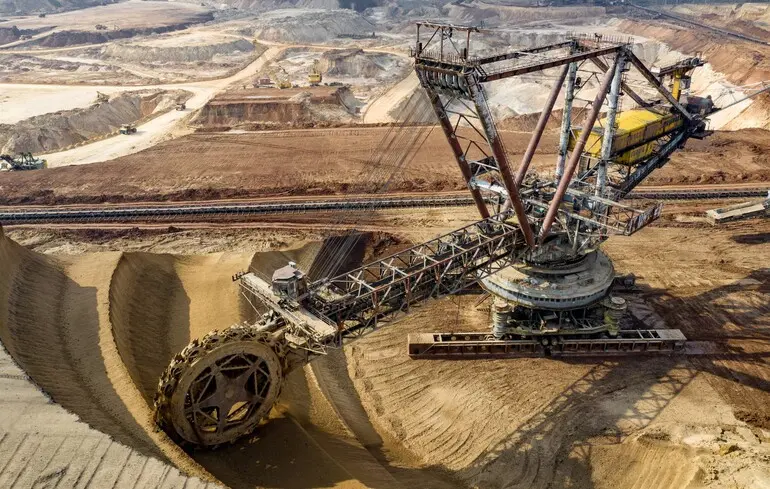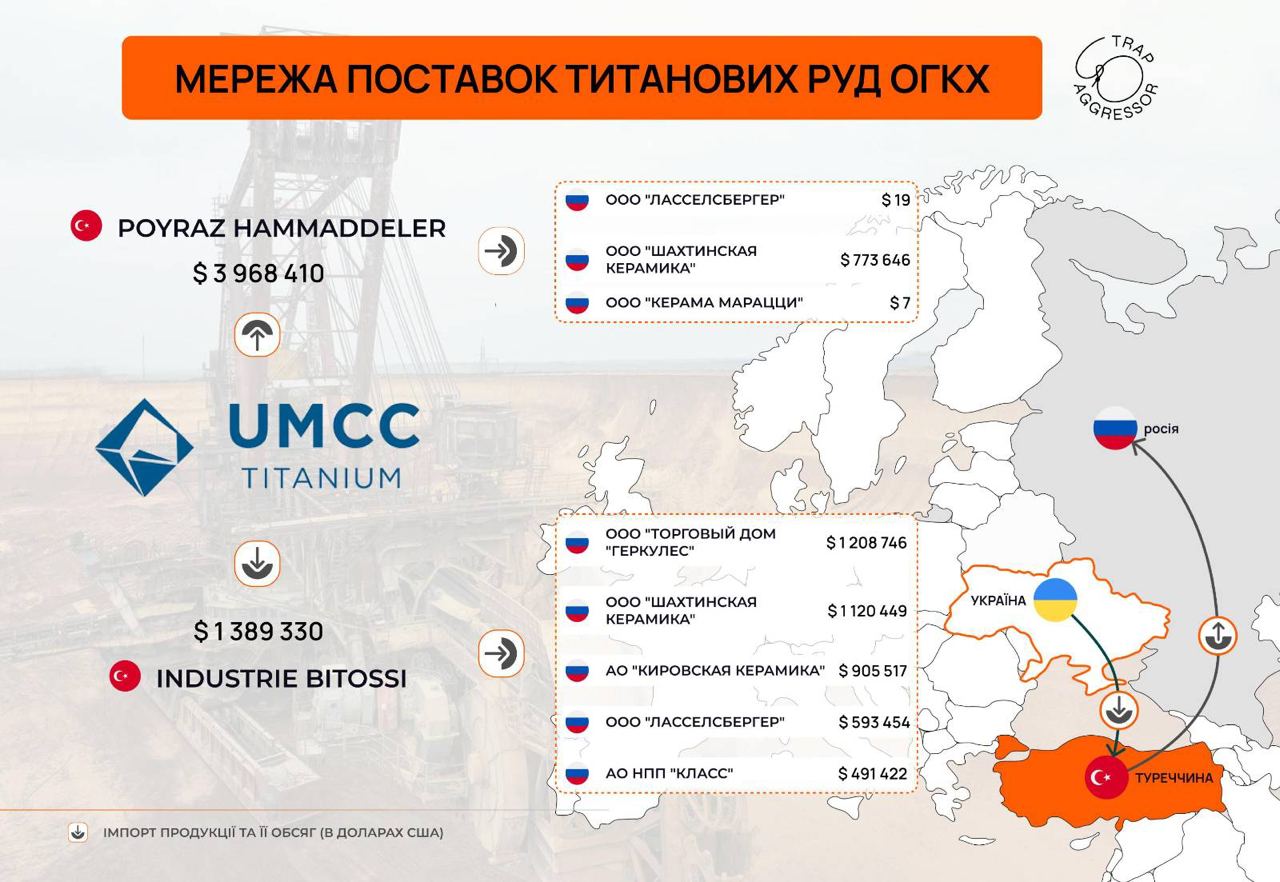Beware of the Azerbaijanis, who Carry Out Titanium. What Is Wrong with the Privatization of UMCC

Back in August, ZN.UA wrote about the strategic importance of the United Mining and Chemical Company (UMCC) for both Ukraine and the Russian Federation, pointing out the numerous risks of the company's future privatization and giving clear instructions on how to avoid these risks. Are we surprised we haven't heard any of this advice?
Therefore, the sale of the United Mining and Chemical Company took place on October 8, 2024. As reported in Prozorro.Sale, “CEMIN UKRAINE” LLC won the conditional auction. The cost was UAH 3.94 billion (bidding protocol). The conventionality of the auction, as well as the ridiculous sale price, is explained by the fact that there was only one buyer. Its ultimate beneficiary is Azerbaijani businessman Nasib Hasanov. The above-mentioned company is part of the international holding NEQSOL, which throughout its existence maintains very close contacts with the Russians and often buys their assets or assets that are of interest to them. For example, they once bought a share of their telecommunications business in Ukraine from MTS, a Russian telecommunications company. And in the spring of 2022, the holding expressed a desire to acquire, after nationalization, Alfa Bank (now Sense Bank) from the state. However, as noted in Forbes Ukraine, since the sale of MTS, the financial requirements have changed somewhat, and the Azerbaijanis could not confirm the legality of the origin of the funds for the purchase.
Well, already at this stage, it is worth admitting, many questions arise.
First: what kind of "competitive selection" is this that has identified only one bidder interested in buying a strategically important company? In the past, single-buyer sales were canceled due to lack of competition, and we haven't heard of that requirement changing. The second is a consequence of the first: the applicant for privatization made only one step in the auction, which a priori could not significantly increase the sale price. Third, the consequence of the first two and the buyer's analysis: reasonable doubts about the impartiality of such a quick sale of an extremely important state asset, which has geopolitical and, importantly, military significance for our state.
Thus, according to the terms, the winner will be obliged to preserve the main activities of the enterprise, to invest in the technical conversion and modernization of the company at least 400 million UAH. In addition, the new owner of the United Mining and Chemical Company must pay debts from wages and to the budget. In addition, he has to repay overdue payables. But remember, when at least someone in Ukraine took responsibility for not fulfilling such conditions? Or at least when the fulfillment of such conditions was generally controlled?
Even if the new owner fulfills the conditions, it will be small things, considering the key importance of this sale for the titanium industry of Ukraine and Europe as a whole.
The United Mining and Chemical Company is the largest domestic enterprise for mining and beneficiation of titanium ore concentrates. This company includes Vilnohirsk mining and metallurgical and Irshan mining and beneficiation plants.
We will remind you that the United Mining and Chemical Company has been the source of corruption scandals for the last decade, because this state structure was constantly in the field of view of various financial and industrial groups, involving the higher political leadership of the state. In particular, in 2018, the detectives of the National Anti-Corruption Bureau of Ukraine (NABU) under the leadership of Specialized Anti-Corruption Prosecutor's Office (SAPO) sent a case to the court, which clearly indicated that from December 2014 to April 2016, the company suffered losses in the amount of more than UAH 300 million ($12.87 million). But measuring the potential of United Mining and Chemical Company in terms of funds is an extremely amateurish approach.
The company has been in the State Property Fund since the fall of 2019. Already the following year, the then head of the State Property Fund of Ukraine, Dmytro Sennychenko, who, by the way, is wanted by the National Anti-Corruption Bureau of Ukraine for corruption at the Odesa port plant, changed the management of the United Mining and Chemical Company, talking about the fight against oligarchic influence and the destruction of corruption. There were indeed problems, but it is still unclear why only privatization was considered as a way to solve them, if a course was taken to bring order to the state-owned company. Where did all those words like "struggle and destruction" go?
Over time, the absurdity increased: they talked about a significant increase in the number of end users in the client portfolio, the stabilization of the price policy (although in reality the market should set the price for raw materials), and also, which generally makes everyone involved in the industry laugh, about minimizing the risks of products entering the sanctioned territories. Obviously, we were talking about the Russian Federation, for whose military-industrial complex the United Mining and Chemical Company is the closest (not only geographically) supplier of raw materials.
Purely from the point of view of profitability, the United Mining and Chemical Company is really not a very promising company, although with positive dynamics: in 2019, the company's net profit was about UAH 100 million, while in 2020 it was already 350 million. It is clear that in 2022, when Russia launched a full-scale attack, its profitability almost dropped to zero. However, this cannot and should not be taken as the basis of the assessment. At least because this is not the first time when an asset is deliberately devalued before selling for the sake of a discount.
Moreover, this is not the first time they tried to privatize the United Mining and Chemical Company, against the background of which the current successful sale looks at least suspicious. The first attempt was made a few years ago. At that time, as many as 13 companies from Ukraine, Japan, Australia, the USA, Hong Kong, Turkey, China and India expressed interest in participating in the privatization, according to the leadership of the State Property Fund of Ukraine. And this time, only one side showed interest, namely Azerbaijan. The verification of the winner by the Security Service of Ukraine lasted as long as one day, and it took place after, and not before, the auction. With all due respect to the service and its employees, they did not have time for an adequate and thorough analysis.
Has the geological reserves of the United Mining and Chemical Company deposits been assessed according to international standards? If not, why? Are the stories that, as part of the preparation of the object for privatization, a few years ago, mineral reserves on the Vilnohirsky Mining and Metallurgical Plant were almost doubled to 31.6 thousand cubic meters? This gives the company the opportunity to occupy the following shares in the world market: 2.3% of ilmenite, 6.2% of rutile, and 1.4% of zircon. And if so, is the selling price fair?
There was also no word on whether the privatization of the United Mining and Chemical Company would not pose a threat to the economic or security interests of Ukraine, given the Russian Federation's interest in controlling the company. Yes, ideally, the state acts equally as a regulator, establishes rules, and licenses the activities of subsoil users. But do we currently have an effective safeguard that will prevent the export of our ilmenite or its products to the aggressor country? Who will block the import to the Russian Federation through the second and third jurisdictions of titanium ores mined in Ukraine? And the question is not about the paid rent, but about the security of our state.
Let's take a look at the supply chains we tracked in our 2022-2024 global customs declaration database analysis.
Here is one of the examples that proves that the export activity of the United Mining and Chemical Company for the supply of titanium-containing products should always be monitored, including the post-privatization period as well. In 2022, the United Mining and Chemical Company supplied products worth 3 million dollars to the Turkish company Poyraz Hammaddeler San Tic Ltd Sti. In turn, Poyraz Hammaddeler sold this (or similar) products in the Russian Federation for USD 770,000.
Or here is another identical case.
The United Mining and Chemical Company sold ore and zirconium concentrates to Industrie Bitossi for $1.4 million. In turn, in 2022-2023, Industrie Bitossi exported $6.8 million worth of products to the Russian Federation, namely, zirconium and titanium ores, as well as concentrates.
The problem here is not international economic relations and trade, not at all. The problem is that Ukrainian titanium-containing ore can eventually be used to produce elements or parts of weapons that will be used to kill Ukrainians.
The gas of the state oil company SOCAR as an example and a warning
The ultimate beneficiary of “CEMIN UKRAINE” LLC, the company that privatized the United Mining and Chemical Company, is Nasib Hasanov. It is not difficult to identify with whom exactly the specified Azerbaijani is associated.
The most influential network of investigative journalists in the world OCCRP (Organized Crime and Corruption Reporting Project) calls Nasib Hasanov "a close associate and business partner of Ilham Aliyev." The documents, obtained more than ten years ago, indicate that Hasanov controls one of the companies to which, together with three others, Azerbaijani President Ilham Aliyev handed over a consortium of six gold mines in 2006.
It will be recalled that Nasib Hasanov also appeared in mining companies that were "strangers" to the Aliyev family, in particular, Fargate Mining Corporation, which became known as part of the Panama Papers scandal.
The political background of the sale is also ambiguous: the president's office "agreed" the sale of the United Mining and Chemical Company to a company with Azerbaijani roots ten days before Ukrainian President Volodymyr Zelenskyy offered Ukraine's resource potential to Western partners from the rostrum of the parliament. So, either Ukraine sold something not very "tasty" to the Azerbaijanis, which would certainly not interest Western partners. Or our country hastened to sell something really valuable to the Azerbaijanis precisely before the president's generous offer to our key geopolitical partners. Despite all the troubles, the uniqueness of the United Mining and Chemical Company and its growing potential in the era of weapons would definitely be of interest to both Europe and the United States of America. We hastened to choose Azerbaijan with a Russian footprint.
Many countries can produce metal titanium, but only if they have raw materials, namely titanium sponge. And it is produced, apart from Ukraine, by and large only by Russia, China, Kazakhstan and Japan. It is important that the Russian Federation has the world's largest plant for processing titanium raw materials and manufacturing titanium sponge. Extraordinary vertically integrated facilities have been built there, from further processing up to the production of final titanium products, including aviation ones. But the supply of raw materials is only 10% of the need. Even with the full capacity of the Tugan Mining and Processing Plant, there will be 20–25% of the demand. It turned out that Azerbaijan, which is increasingly trying to appear before the Russian Federation in a favorable light, bought a valuable asset from Ukraine at a ridiculous price in a very timely manner.
In contrast, Western countries, except for Japan, have no titanium sponge manufacturing capacity at all. Japan supplies the USA with it for about 80-85%, while the shortage comes from Kazakhstan. The rest of the Western world would definitely like to diversify the suppliers of the scarce titanium sponge. And this could be done if our Zaporizhzhia titanium-magnesium plant was operational, because it is the only one in Europe and one of the largest in the world. But without the titanium raw materials supplied there by the United Mining and Chemical Company, this is impossible. Indeed, Azerbaijan is very timely ... well, you understand.
In this situation, it may be about a conscious surrender of the national interests of Ukraine, or about a typical corruption "deal" that was concluded, or about a combination of the first and second options in different proportions, but it is definitely not about finding a strategic partner, strengthening political alliances through business ties or at least strategic thinking.
Read this article in Ukrainian and russian.
Please select it with the mouse and press Ctrl+Enter or Submit a bug


















 Login with Google
Login with Google